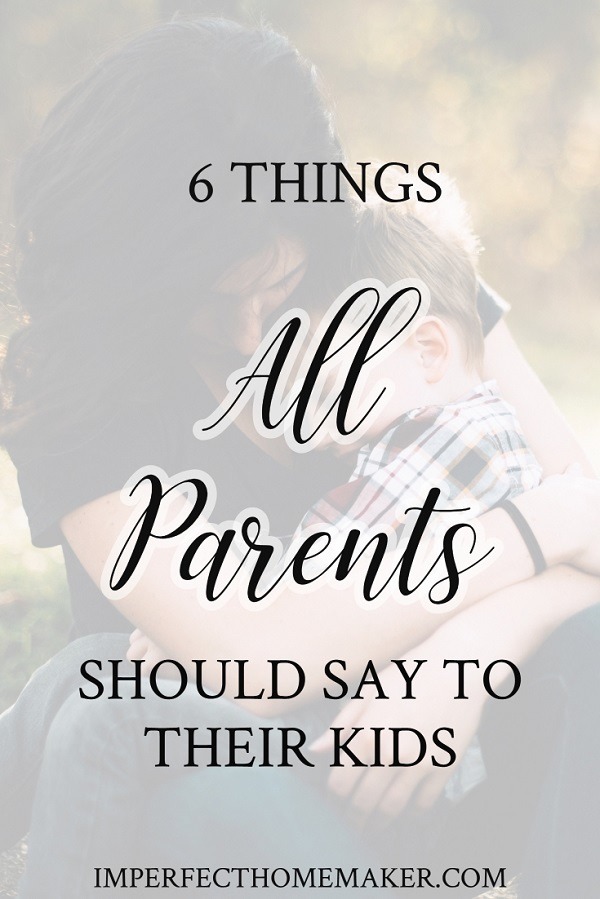6 Things All Parents Should Say to Their Kids
We've explored some things children should not be allowed to say to adults, but have you considered the way you speak to your children?
“But I'm the parent! I can say what I want!”
Yes, you are the parent, but the Biblical commands to “be kind one to another” and to let our “speech be always with grace” do not exclude the way we speak to our children. The Proverbs 31 woman opened her mouth with the law of kindness, and I don't doubt for a minute that included the way she spoke to her children.
Here are six things I believe all parents should say to their kids:

1. Please.
“Wait. Back up. I'm the parent. They're the kid. I tell them what they're going to do; I don't ask them.”
While children should be expected to obey when they're given a command, I don't think that necessarily means parents need to give commands by simply barking orders. “Son, would you please unload the dishwasher?” sounds so much more pleasant than “Go unload the dishwasher!”
Now, it's important to understand that asking it as a question does not mean that saying “No I won't unload the dishwasher” is an option. My children know that “Please unload the dishwasher” means “Go unload the dishwasher” and that the correct answer is “‘Yes, ma'am, I sure will,” but it just makes the atmosphere of our home more pleasant than barking orders all the time. Sometimes the situation or the attitudes of my kids call for things to be phrased as a direct command, and there is definitely a place for a more no-nonsense approach, but that doesn't have to be the case every time you need them to do something.
By saying please to your child you are recognizing that they are a person who is deserving of just as much respect as anyone else. When all you ever do is bark orders it becomes easy to turn your children into your personal servants. “Pick up that piece of paper I dropped.” “Go put my glass in the sink.” They're your children and need to obey, but they're not your slaves.
2. Thank you.
Just as you should show respect to your kids by saying please, you should teach them how to be grateful to others by showing your gratefulness to them. When your child does something to help around the house, even if it's something you told him to do, thank him for it. Don't you enjoy doing things for others much more when you're thanked for your efforts? You teach your children how to appreciate what others do for them when you show appreciation for what they do at home. Thank your child for a job he's done and see how much more motivated he'll be next time you need him to do something!
3. You're special.
You don't have to use this exact phrase, but every child should know that they are valuable to you. You can show them this by the time you spend with them, but you should also be verbalizing it. Some of the things I say to let my kids know they're special to me:
“You're my favorite 5-year-old!” “I don't know what I'd do without you!” “You're my little princess/prince.” I also have various terms of endearment for each child that I use regularly.
I also like to sing songs to them like “You are my sunshine” or goofy little made-up stuff that I'll spare letting you hear. 🙂
4. Good job.
Again, you don't have to use these exact words, but there is hardly a greater motivation for a child to do what he's supposed to do than to hear his parents verbally express that he did a good job at something. I have one child in particular who thrives on this type of praise, and I simply can't overdo it. When I tell him how happy I am that he finished his dinner without complaining or that he did his best cleaning his room instead of stuffing things in the closet, he absolutely glows! I look for as many things as I can, no matter how tiny, to praise him for. And the more I do it, the more motivated he is to keep on doing what's right.
On the other hand, some children won't see everything they've done as a big deal. Be sensitive to the personality of each individual child. As an extreme example, don't embarrass your twelve-year-old by telling him what a great job he did eating his dinner without spilling it on the floor. Find the things that you know your child worked hard to accomplish and make those into a big deal.
5. I'm sorry.
Try as we might, parents, the reality is we sometimes (more often than we'd like) mess up. You know what's worse than messing up? Not admitting that we've messed up. Your child knows when you've messed up. He knows you're not perfect. So it will mean a lot to him for you to say “I'm sorry I got upset and yelled at you. That wasn't the right way for me to handle the situation. Will you forgive me?” Your credibility with your child will be ten times greater than it would be if you tried to ignore what you did wrong.
6. I love you.
Every child in the world should hear this phrase at least once a day. Unfortunately many don't, and that doesn't only include children living in orphanages or those living in the slums who are passed from caregiver to caregiver. Don't just show your kids you love them; tell them! These words are something every child craves!
What would you add to this list?
